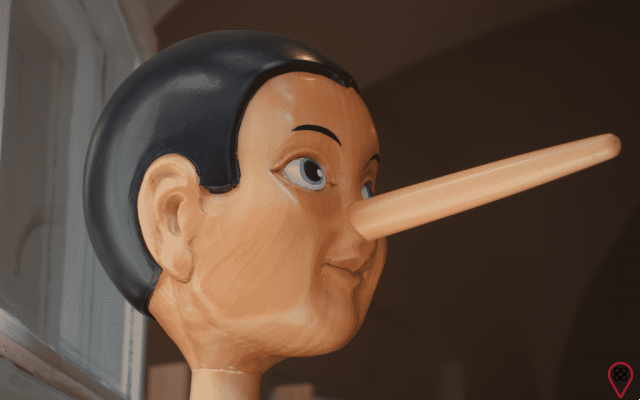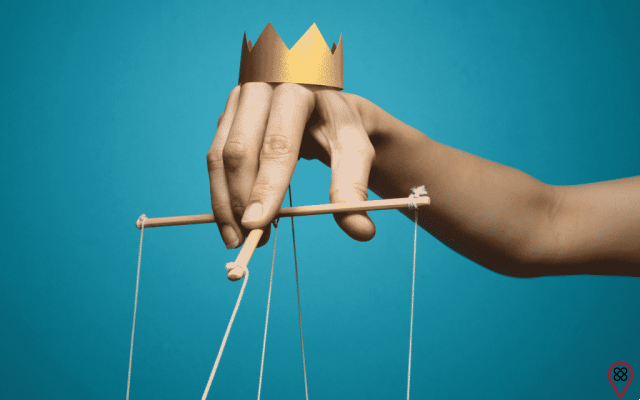O April Fools' Day is celebrated annually in April 1. On that date, it is common for people to tell small lies, to amuse friends and family. As this has already become a tradition, it is even difficult to deceive someone. However, there are still those who can perform this feat with mastery.
However, on the other days of the year, the lie is not seen with good eyes. Even the discovery of a lie can cause pain, sadness, disappointment and anger. Therefore, we are aware that lying is not a positive attitude, which should be avoided.
Despite this, we continue to lie, even to those we love the most. And why do we do this? Reflect on this issue below. And, based on that, investigate what changes you need to make in your life and in your relationships, to get rid of the lie.
Is there a good lie?
Before investigating what leads us to lie, we need to talk about the “good lie”. It's that little lie, which seems harmless, or that we tell so we don't hurt someone else. Does this really exist? Or is no lie well-intentioned?
David Livingstone Smith, philosopher and psychologist, classified lying as a necessity for life in society: “Without lying, life in society would collapse. If you doubt that, just imagine what life would be like if you decided to tell all your friends what you really think of each one of them.”
From this perspective, we understand that lies can be unavoidable. Sometimes we want to avoid an uncomfortable situation and we make a false comment, which will not have any negative impact. If the lie will not harm other people, it is likely to be harmless and therefore good.

Or else, we don't want to spend so much energy telling a difficult truth, which would cause bad feelings, and we opt for a most convenient lie, which will not change the other person's life. It's like saying you liked someone's haircut, even though you didn't, just so you wouldn't hurt them.
In this situation, telling the truth to someone who has just changed their look would only bring sadness, low self-esteem and discomfort. On the other hand, the harmless lie will maintain the self-confidence of the one who cut her hair, not least because the opinion of others should not impact how she feels about herself.
But turning lying into a habit can be dangerous, even when the deception does not have a bad purpose. That's because we start to gain more confidence and more ability to tell untruths and we can lose track of what's harmless and what's not. As a consequence of this, we start to lie more, not only to avoid discomfort, but to do well in a situation. Learn more about it below.
Why do we lie?
In the book “The Pure Truth About Dishonesty”, from psychologist Dan Ariely, we understand that human behavior is driven by two principles: “We want to see ourselves as honest and honorable people, but we also want to take advantage and win as much as possible”.
As these two desires are contradictory to each other, most people find an unconscious solution for them, also described by the author: “By deceiving just a little, we can to benefit cheating, and still seeing ourselves as wonderful human beings.”
That is, we have the need to take advantage of the situations that are around us. For that, we need to lie in some cases. Since lying is a reprehensible attitude, we opted for a milder version of the deception, to keep a clear conscience and still get what we want.

But there is another explanation for why people lie so much. For psychologist Thaiana Brotto, there are some sensations that are behind the lie: anxiety, insecurity, fear, anguish, unhappiness and uncertainty. So we lie to hide these negative feelings, which make us vulnerable.
In this sense, lying is a defense mechanism, not a way to take advantage of a situation. This does not mean that she is less harmful, but it is a sign that the person who is lying needs to resolve some feelings that are manifesting within her.
In two specific cases, it is essential that those who are lying seek psychological help. Identify what they are:
compulsive lying
Compulsive lies are created by people who suffer from low self esteem. In general, they develop stories in which they present themselves as heroines or superior to others.
This need to stand out in relation to other individuals deceives not only those who live with compulsive liars, but to themselves. With the frequency of lies, the very person who created the untruth is likely to believe what he is saying.
In relationships and in job interviews, for example, this kind of attitude can result in frustration and disappointment. After all, compulsive liars are not who they say they are, and over time this will show. Soon, the credibility and trust in these people will be shaken.
pathological lies
If compulsive lies usually harm the person telling them, pathological lies are more serious. The reason for this is that this type of deception involves the third party emotional manipulation, who are deceived by outlandish lies.

Pathological lies are necessarily developed so that one person gets along in a situation, harming another individual. For this, she distorts facts, creates a version in which she is a victim of her own attitudes and makes the other person doubt her own perception of the event in question.
This posture compromises life in society, the maintenance of lasting relationships and can even lead to criminal acts, which are easily justified by the liar. Therefore psychological treatment is essential to reverse this situation.
You may also like
- Surprise yourself with the biggest lie in the world
- Learn to identify a pathological lie
- Stop living in lies and fear
With all the information we present here, it was easy to understand that people lie for various reasons. Some lie to avoid discomfort, others distort a fact to gain an advantage over others, and there are those who tell lies just to feel better about themselves. Is that you? Reflect on what is making you lie to others and, if necessary, seek psychological help.

























